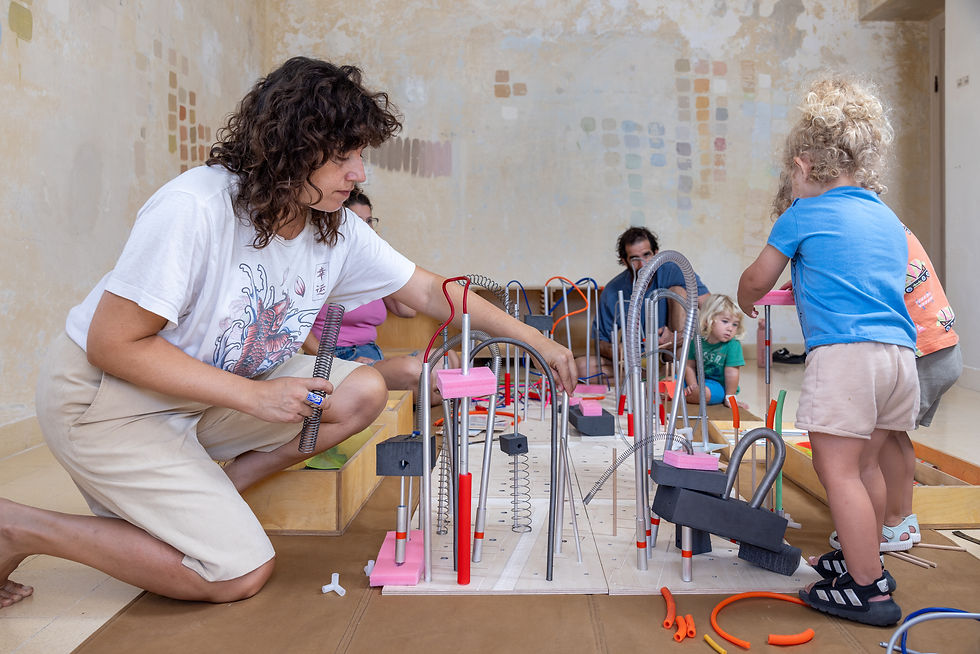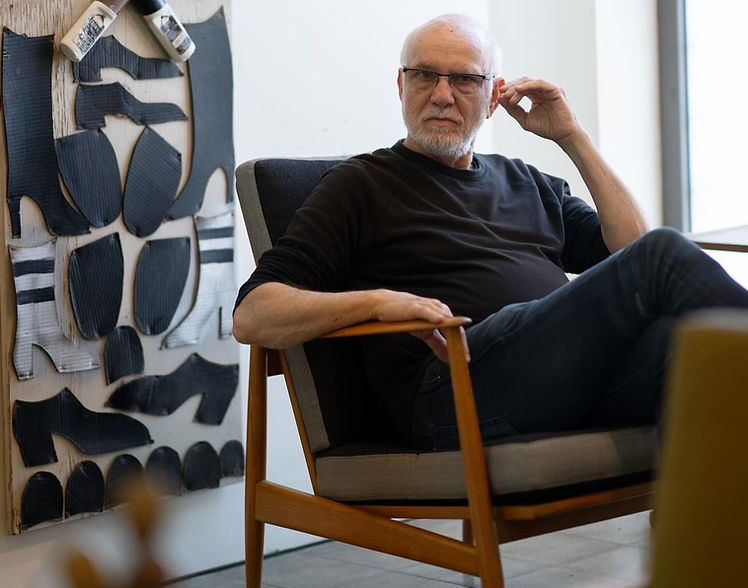01/09/2022–01/05/2023
Resistance
Is conservation a curse or a blessing? Who has the right to the White City? What is happening to Tel Aviv-Yafo?
How do you invent urban myths? How to rethink air rights? Does the White City as a public space enable civil action?
Over the course of four months, from September 2022 to January 2023, the residency participants explored the issue of historic preservation and the commons - between the public and private interest. The residents examined the various conflicts and questions raised by the UNESCO (United Nations Educational, Scientific and Cultural Organization) declaration in 2003 of the White City of Tel Aviv-Jaffa as a World Heritage Site, and the challenges arising from this declaration 20 years later.
The purpose of the residency program at Beit Liebling is to promote joint investigation and action, as part of a platform for discussion of processes taking place in the city.
The program is part of a joint multidisciplinary research with the Laboratory for Planning Policy at the Faculty of Architecture and Urban Planning at the Technion (academic advice Prof. Nir Moalem and Dr. Einat Mendelson Schwartz). The research examines challenges and conflicts arising from policies in the field of preservation of the built heritage, in particular in sites declared by UNESCO. and as world heritage sites, while looking at the case study of the White City in Tel Aviv-Yafo. The study examines the tensions that arise in world heritage sites, and how (and whether) policies in the field of built heritage conservation exacerbate or moderate these tensions.
The Garden City vision presents an ongoing aspiration to combine rural quality of life alongside a functional city and an active and vibrant urban fabric. Beyond the physical aspect, the vision also refers to economic and social aspects that complement a holistic concept of human relations and the environment in an urban society. From this concept, and in particular Geddes' plan for the city of Tel Aviv, we will refer to three standards that together make up the city of gardens: the residential building, the public garden, and the residential block.
Is conservation a curse or a blessing? Who has the right to the White City? What is happening to Tel Aviv-Yafo?
How do you invent urban myths? How to rethink air rights? Does the White City as a public space enable civil action?
Over the course of four months, from September 2022 to January 2023, the residency participants investigated the issue of historic preservation and the commons - between the public and private interests. The residents examined the various conflicts and questions raised by the UNESCO (United Nations Educational, Scientific and Cultural Organization) declaration in 2003 of the White City of Tel Aviv-Jaffa as a World Heritage Site, and the challenges arising from this declaration 20 years later.
The purpose of the residency program at Beit Liebling is to promote joint investigation and action, as part of a platform for discussion of processes taking place in the city.
The program is part of a joint multidisciplinary research with the Laboratory for Planning Policy at the Faculty of Architecture and Urban Planning at the Technion (academic advice Prof. Nir Moalem and Dr. Einat Mendelson Schwartz). The research examines challenges and conflicts arising from policies in the field of preservation of the built heritage, in particular in sites declared by UNESCO. and as world heritage sites, while looking at the case study of the White City in Tel Aviv-Yafo. The study examines the tensions that arise in world heritage sites, and how (and whether) policies in the field of built heritage conservation exacerbate or moderate these tensions.
Susanna Mariacher is an Austrian artist engaged in teaching, social design, participatory art and architecture. At the heart of her work pulses the desire to rethink the architectural heritage and the public space in their socio-political context. It collaborates with individuals and groups in actions of interventions in the space, in performances and artistic-social projects, in reclaiming the space and developing the concept of "public space". Mariacher is a member of the architectural collective AKT, and was recently chosen with Herman Czech to curate the Austrian Pavilion at the Venice Architecture Biennale in 2023.
Daniel Chechik is a photographer for the "Haaretz" editorial team and editor-in-chief of the newspaper's "Exposure" photography blog. Chechik examines his natural environment through a photographic practice that focuses on the search for visual expressions of contemporary emotion inherent in the landscape and the people. His works are presented both as series of photographs and in artist books. The different platforms, on which he operates, allow him to present changing narratives through the same photographs. Chechik works with photographic films that have sometimes been exposed to radiation and kept in harmful conditions to emphasize the material characteristics of the photographic medium and the objects of the works.
Tzipa Kempinski is a former journalist ("News", "Ha'ir", "Maariv"), she is an editor, instructor of editors and journalists, lecturer and creator. In the last decade, she has been researching and documenting the urban changes - big and small - taking place in the Florentine neighborhood in Tel Aviv through daily wanderings and gathering information, mainly visual, as a continuation of her occupation of street culture. She presented solo exhibitions at the alternative galleries Halit, Mashona, the Red House, and in group exhibitions, including the Nahum Gutman Museum and the Haifa Art Museum. For years she wrote a blog about the Florentine neighborhood called "Street View", which was published on Ynet's "Accent" website.
Omer Krieger is a multidisciplinary artist who creates performances and video works and curates exhibitions and activities in the public space. He is interested in the relationship between art, citizenship and action, and connects performative actions, social situations, forms of public assembly and civic choreographies, in local and international contexts. Krieger is the founder and co-leader of the research and action body "Public Movement" (2006-2011); artistic director of the "Under the Mountain" festival for new public art (2005-2011), and artistic director and co-founder of 1:1 - Center for Art and Politics In Tel Aviv (2018-). In September 2022, the premiere of his new multi-participant show - "Pinoy" took place at the Israel Festival.
Shir Raz is a multidisciplinary artist who studies the ways in which meaning is given to places in relation to their historical context. She creates installations that combine traditional techniques of photography, lithography and drawing with contemporary mechanisms, archival materials and 3D printing, linking the historical and the futuristic. Her works have been shown in exhibitions in Israel and around the world, among others at the Saatchi Gallery, the Royal Academy and Tate Modern in London and the Hastings Museum in Great Britain. Winner of the Ministry of Culture's Young Artist Award (2022), a study scholarship from the Royal College of Art, and the Yossi Berger Excellence in Photography Award from the Bezalel Academy. Participated in artist residency programs in Arad (2018), in Isolation Residency (2020), at the Bechberi Gallery (2021) and at the kibbutzim seminar in Tel Aviv (2021).
Elena Shtelzer is an Israeli conceptual artist born in Germany whose work criticizes social and political systems, especially those associated with the art world. Shtelzer is known mainly for her large installations that are linked to the field of institutional criticism and are expressed in ways of architectural changes and disturbances. Sometimes she uses institutions both as the subject of the work and as her site, in a way that sometimes provokes controversy, as for example in her bachelor's thesis Harpoon 12 at Shanker College, a work that was selected for display at the Triennial of Modernism in Berlin (2019). In the work SUBMISSION (2022) she accurately calculates the amount of stress that the Bezalel Academy of Art building can bear before it reaches its breaking point. Steltzer completed two master's degrees - one in German philology and philosophy from the University of Vienna, and one in art at the Bezalel Academy of Art and Design (2022). She won the Shankar Creative Encouragement Award (2019) and an Excellence Grant from the Daniel Arison Foundation (2019).







